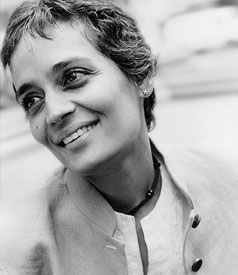People in France are undoubtedly discussing Albert Camus’ Pantheonization in order to celebrate a character that has disappeared from this country: that of the writer-activist. A thousand leagues from here, in New Delhi, Arundhati Roy doesn’t even ask: the author of the global best-seller, “The God of Small Things,” takes the visiting journalist along to a meeting of support for victims of the military repression in Manipur, a small state in eastern India. The author quietly takes a seat on a stone bench at Delhi University among a hundred other participants and waits for her turn to speak. To the side, a banner proclaims, “A different world cannot be built by indifferent people.”
If they read Arundhati Roy, her fellow citizens cannot remain indifferent: in “Listening to Grasshoppers” (Penguin Books, New Delhi, 2009), the best-known author in India delivers a detailed and convincing critique of “the world’s biggest democracy,” the fascist tendencies of which she denounces.
Manipur, in particular, could be the prototype for those aberrations: in 1958, in order to fight against an independence movement, the government designated the little state a “disturbed area,” within which the army would be endowed with special powers. That has led to numerous excesses, condemned, for example, by Human Rights Watch in 2008. But violent military action continues in the Northeastern states such as Kashmir and in the eastern states of the Indian Federation where the powerful Naxalite rebellion is growing.
“During the last decade,” Roy states, “people killed by the security forces have numbered in the thousands.” However, she maintains, the virus of military violence is not confined to troubled regions only: the whole country is prey to rampant fascism: “After the fall of the Berlin wall,” she explains later at her kitchen table, where she sits by a stack of books and newspapers, “India realigned itself with the United States. At the same time, that country passed almost instantaneously from support for Islam – against the Soviet Union – to demonization of Muslim movements, presented as terrorist groups. That allowed the BJP (the nationalist Hindu party) to expand rapidly on the basis of a theme of ‘Hindu pride.'” The opening up of the economy did not counteract that tendency – on the contrary: “As in Nazi Germany, fascism is associated with economic regeneration. The big companies support the BJP leaders because they privatize and give those companies the land taken from peasants.”
Very aggressive security controls for domestic flights as well as the presence of armed soldiers behind sacks of sand in the Delhi subway bear witness that serenity does not reign within this country. And, almost daily, the newspapers talk about a skirmish in the regions of the Naxalite rebellion over which the government no longer maintains control.
A Day in Prison
But the degeneration of democracy begins within the very heart of political institutions: “The majority of deputies are millionaires,” Arundhati Roy explains. “You cannot win a seat unless you are supported by the big companies. Do you know that the electoral campaign in India costs more than the presidential campaign in the United States?”
As for counterweights, such as the Supreme Court or the media, they have, in essence, all passed into the hands of Americanized elites. The author spent a day in prison in 2002 for having criticized the Supreme Court. “All the institutions of democracy have been emptied of their meaning and work together for the benefit of the elites,” she asserts. When I point out that she is free to express herself, to write and to speak, she answers: “That’s not democracy. Democracy is government by and for the people.”
Does the author exaggerate? Kalpana Sharma, a left-leaning activist Mumbai journalist, deems Roy’s analysis and work useful, but tempers her pessimism: “There has been great progress at the village level,” she says, “with greater power accorded to local councils, the Panchayat, with the law in favor of rural employment, the National Rural Employment Guarantee Act (NEGRA). The battle is not lost.” To which Roy retorts: “I don’t see my work as having to maintain a subtle balance of positions. Fascism is the slow infiltration of all the State’s instruments of power, a slow erosion of public freedoms, daily – but not particularly spectacular – injustices.”
Under these circumstances, does any hope remain? “There’s a very positive thing in India: people are exceptionally aware of what is happening. The elites and the media, no; but on the ground, people know.” The author would like to move away from the news, to make progress on the fictional book she is mulling over. But she confesses to the “excitement” of this life. The following day, she was to leave for Kashmir. To investigate and, no doubt, to condemn.
Translation: Truthout French Language Editor Leslie Thatcher.
Join us in defending the truth before it’s too late
The future of independent journalism is uncertain, and the consequences of losing it are too grave to ignore. To ensure Truthout remains safe, strong, and free, we need to raise $46,000 in the next 7 days. Every dollar raised goes directly toward the costs of producing news you can trust.
Please give what you can — because by supporting us with a tax-deductible donation, you’re not just preserving a source of news, you’re helping to safeguard what’s left of our democracy.
